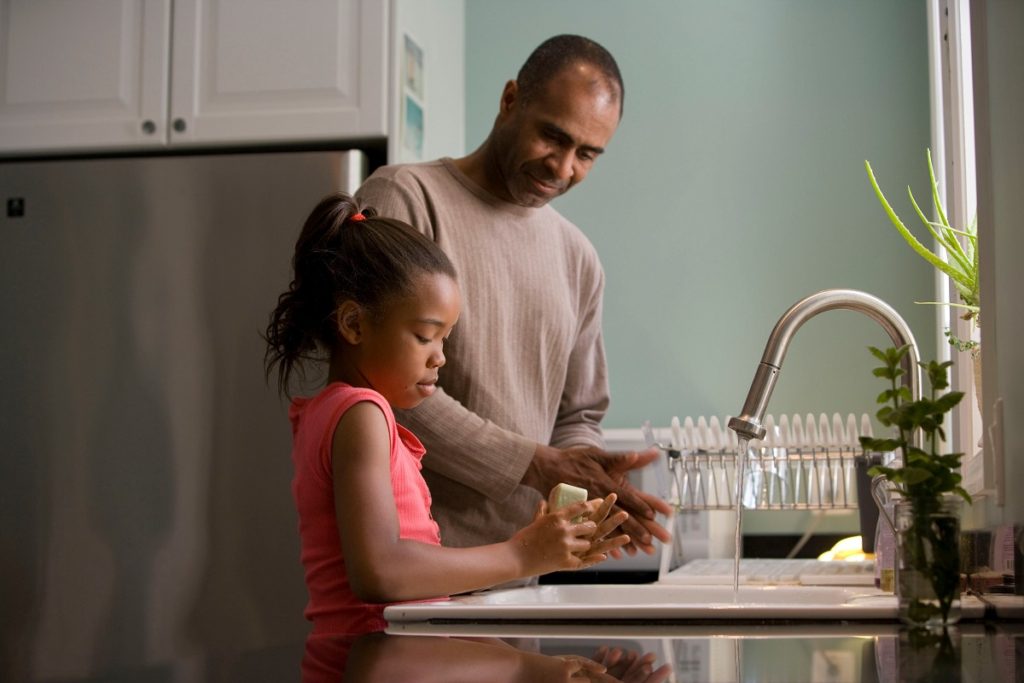
It’s incredibly important to make sure your children know their feelings are valid. Create a space where they feel that you’re responding to their concerns with care, and share with them how you’re feeling (age-appropriate) too. For example, “I know sometimes I look worried. Grown-ups get scared too at times, just like children, but I’m OK.”
With many of us trying to re-adjust to a hugely changed routine, it may feel confusing to your children if you pretend that everything is fine and ignore the messages that are being broadcasted around them. Explaining things clearly can help. Try “This is a sickness, a bit like the flu, and some people may get it, including some of our family. We are focusing on ways to get through this time and help as many people as we can to stay well, which is why we have to stay inside.”
Tell them regularly that you love them, and that this will never change, although some other things will have to change for a while. Aim to create a routine and have some structured time throughout the day, such as keeping bedtime and mealtime routines fairly consistent. Help them to stay in touch with friends and other members of the family, to help reassure them that there are many people who care about them.
Remind them that you are here whenever they need anything, and that you will try and answer any questions they have. If you don’t have the answers at that moment, tell them you will do your best to find out. Even if you need to go out to work during this time, remind them that you are thinking of them when you’re apart.
Creating space for fun is just as important as ever and will help them to use up any anxious energy they may have. It’s also a good distraction and may help you together as a family to relax. Let them lead the way in what they would like to do at times. “Let’s do some things that you enjoy.” It helps them feel important and to have some element of control when things around them are disrupted.
Find time to explore situations through history where difficult things have happened and how people have come together to work things out. Remind them that there are many doctors and scientists who are working hard to come up solutions. A great example in the UK is Horrible Histories, which is popular with many children and may provide some interesting new learning and much needed perspective.
Art and crafts are fantastic ways to occupy children, help them to express their feelings and make sense of what is going on around them. Think about creating a notice board of all the things you will plan to do when things start up again, with friends, at school etc. Help them to think about all the things they have already done that they’ve enjoyed.
Set some time during the day to just be with your children and enjoy their presence; let them talk if they want to, but enjoying some peaceful and quite time can soothe them and help you both to feel calm. Watch a favourite TV programme, read a favoured book, listen to some music - whatever calms and soothes both you and your child alongside eachother.
Think of ways to orient them to what they’re grateful for so you can gently remind them that although things are difficult right now, there are some good things to focus on. This is important as the majority of the news is very anxiety provoking. Help them to focus on all the acts of kindness that are going on around them and how they can be kind.
Seek out ways to keep yourself as calm and centred as you can be. Remember: children are like sponges - which means they’re not only soaking up the events around them, but they’ll also be focusing on the way you’re responding to what’s happening.
Think about ways to manage your own stress and anxiety as an act of self-compassion. This will enable you to be there for those who need you and don’t forget to reach out to your own support network.
Remember, you know the children you care for better than anyone. So, adapt these suggestions in ways that you think they will help best, and be age- and language-appropriate. You can find more helpful resources on CABA’s website. You can also visit CABA’s dedicated, regularly-updated coronavirus support page which has more information on how they can help during this time, including emotional support and financial assistance.
Take a trip into into a world of wisdom

Join the Academy and learn from some of the best spiritual
and wellbeing teachers in the world
Join the Academy and learn from some of the best spiritual
and wellbeing teachers in the world